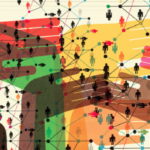I remember only having a handful of ‘white’ kids in my church. Thinking back, it wasn’t even that they were ‘white’ and the rest of us weren’t, but more about the fact that everyone was “something else”. At least this was the best vocabulary I had, at a young age, when trying to define the diversity of my church. I grew up in the Miami-metro area of South Florida. To this day, Miami is one of the most global cities in the country. My church was no exception to this.
My church was, in an effortless way, multiethnic. I remember having Haitians, Puerto Ricans, Venezuelans, Jamaicans and Filipinos (just to name a few) in attendance. Most of the families (including my own) were interracial. It wasn’t until my recent journey through graduate school that I realized how formidable this experience was in my faith journey. I have come to expect multi-ethnicity in the church and I’m finding that my perception and expectation of it is rare. I’m also learning that my experience in a multiethnic church has given me a beautiful perception of Jesus.
Lately, “Multi-ethnic” Church has become a bit of a buzzword in the Christian community. Although the idea has been around for years, it’s been slow-growing in popularity. Because of my experience growing up, I decided to focus on Multiethnic Church Identity in my graduate work. What I’m finding is that although many churches (and church planters) have a strong desire for multi-ethnicity, few of us are able to conceptualize what that actually means. While we may have some theology surrounding the need for diversity, it’s harder to implement than we expect. Despite this challenge, I have seen, through my own experience, that multiethnic church truly expresses God’s identity. I’d like to share with you why I believe diversity in the church is essential to God’s mission.
Without diversity, the Church experiences a broken identity:
When we conceptualize sin it is easy to talk about good and evil. But, when Adam sinned it was more than the idea of right and wrong that entered the world. Sin produced a brokenness of fellowship. Genesis 3:15 states: “And I will cause hostility between you and the woman, and between your offspring and her offspring.” The result of sin is that we are no longer able to identify in one another. When sin entered the world division was placed between Adam and Eve. This division is innately passed on to us.
One way we experience this division is through uniformity and homogeneity. Homogeneity is a subconscious thing (which makes it hard to recognize). In my work with multiethnic churches, I see the prevalence of this idea. A church’s natural tendency is toward homogeneity. We want to worship with people who like the same music, speak the same language and eat the same food that we do. We find it easier to identify with a God who thinks, looks and acts just like we do. While these things aren’t bad, we must recognize that homogeneity and uniformity have an ugly underside.
Homogeneity says: “It’s easier to relate to people who are like me.”
Uniformity says: “If it’s not done in a way that I would do it, it’s not ok.”
The roots of these thoughts are divisive. Brokenness of intimacy affects the way we identify with others. We say, “They are not like us.” These thoughts cause us to look inward, rather than looking outward. Instead of looking for the expression of God in others, we create factions, dissention and identity in what we believe, rather than focusing on whom we believe in.
Because of division, we forget that God’s heart is inclusive. We forget that God’s identity is expressed in diversity. When we start to look for God’s identity, we can start to ask, “Who’s not in the room?” When we pursue diversity, we start to understand that God calls us into a “belonging”- a restoration of this division. God does this through an expression of his fullness.
Without diversity, the Church misses out on the fullness of God:
When we look at the Bible the fullness of God is best expressed in a corporate identity. God is a God of interdependence, of relationship and of fellowship. (He himself is expressed in a relationship of God, Jesus and the Holy Spirit.) The fullness of God is expressed in relationship.
This means that when he looks at us, He also views us in relationship to others. This is why God calls the Church the ‘bride of Christ’. Because we live in a Western culture, that so deeply values individualism, independence and self, some people may have a hard time with this. But we were not created to be independent. Think about it, here we are—the church universal (for all time and space for that matter) and together we represent Christ’s one bride. God views us a shared identity in relationship to Him.
It was God’s intent to give us the fullness of this identity through diversity. When God created the Church, He pursued diversity. The Holy Spirit came at Pentecost, a time where “every nation under heaven” was present to receive Him. He wanted every language, tribe and tongue to be able to identify with Him. His heart has always been for the world. God’s heart was that His bride, the Church, would be diverse as a reflection of His fullness. Paul echo’s this when he references the church as a body—all various parts of one member.
One of my favorite theologians, N.T. Wright, puts it this way: “‘The body’ is more than merely an image of unity-in-diversity; it’s a way of saying that the church is called to do the work of Christ, to be the means of his action in and for the world.” When we understand diversity in the fullness of Christ, we can better understand our mission.
Without diversity, we miss that God’s mission is the Church:
To continue in Wright’s words:
“From the very beginning, in Jesus’s own teaching, it has been clear that people who are called to be agents of God’s healing love, putting the world to rights, are called also to be people whose own lives are put to rights by the same healing love. The messengers must model the message.”
We forget that mission is not just to the world but also for the whole world. Yes, Adam’s one sin brings condemnation for everyone, but Christ’s one act of righteousness brings a right relationship with God and new life for everyone. In Christ we have a sense of belonging, and identity that is transcendent of sin and division. This includes those of us who already believe– we must first step back and look at our own identities. How are we pursuing diversity in God’s kingdom in order to be reconciled to one another?
It is in belonging to and expressing a corporate identity in God that we defy the independence of this world. The power of diversity in Christ shows the way God uses our participation in a diverse body of believers to move us to reconciliation. Once we have experienced this reconciliation, we can, as N.T. Wright said, model this message. It is only once we are pursuing diversity–watching God do this work in us to overcome our tendencies division and uniformity– that we can be the church: the mission to the world.







Missio Alliance Comment Policy
The Missio Alliance Writing Collectives exist as a ministry of writing to resource theological practitioners for mission. From our Leading Voices to our regular Writing Team and those invited to publish with us as Community Voices, we are creating a space for thoughtful engagement of critical issues and questions facing the North American Church in God’s mission. This sort of thoughtful engagement is something that we seek to engender not only in our publishing, but in conversations that unfold as a result in the comment section of our articles.
Unfortunately, because of the relational distance introduced by online communication, “thoughtful engagement” and “comment sections” seldom go hand in hand. At the same time, censorship of comments by those who disagree with points made by authors, whose anger or limited perspective taints their words, or who simply feel the need to express their own opinion on a topic without any meaningful engagement with the article or comment in question can mask an important window into the true state of Christian discourse. As such, Missio Alliance sets forth the following suggestions for those who wish to engage in conversation around our writing:
1. Seek to understand the author’s intent.
If you disagree with something the an author said, consider framing your response as, “I hear you as saying _________. Am I understanding you correctly? If so, here’s why I disagree. _____________.
2. Seek to make your own voice heard.
We deeply desire and value the voice and perspective of our readers. However you may react to an article we publish or a fellow commenter, we encourage you to set forth that reaction is the most constructive way possible. Use your voice and perspective to move conversation forward rather than shut it down.
3. Share your story.
One of our favorite tenants is that “an enemy is someone whose story we haven’t heard.” Very often disagreements and rants are the result of people talking past rather than to one another. Everyone’s perspective is intimately bound up with their own stories – their contexts and experiences. We encourage you to couch your comments in whatever aspect of your own story might help others understand where you are coming from.
In view of those suggestions for shaping conversation on our site and in an effort to curate a hospitable space of open conversation, Missio Alliance may delete comments and/or ban users who show no regard for constructive engagement, especially those whose comments are easily construed as trolling, threatening, or abusive.